You’re standing at the dealership, and the keys to a new future are almost in hand — but one question remains: Honda vs Hyundai?
Few purchases carry as much financial weight as buying a new vehicle, making it essential that every dollar spent delivers real-life value. So, if you’re wondering whether Honda or Hyundai deserves your trust, stay with us — the answer is closer than you think.
Today’s blog explores reliability, pricing, features, fuel economy, and resale value — everything you need to settle the Honda vs Hyundai debate once and for all!
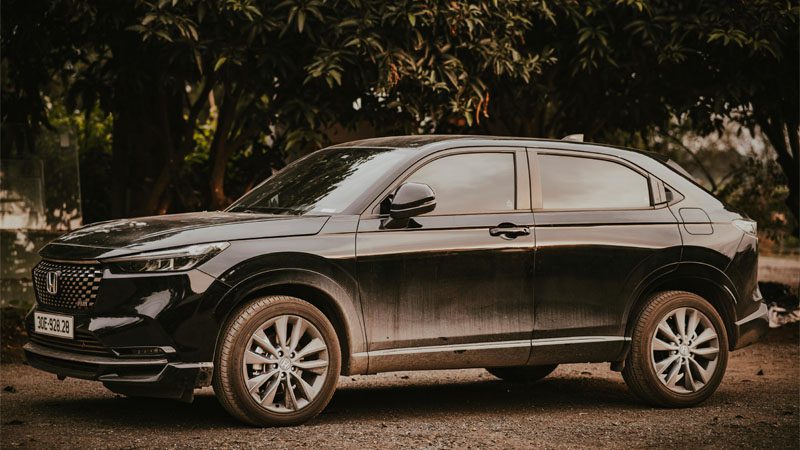
Brand Overview: Honda Cars vs Hyundai Cars
The Honda automotive company, originally known for its motorcycles, traces its roots back to post-war Japan, when Soichiro Honda set out to make mobility widely accessible.
Over the decades, Honda vehicles earned a reputation for engineering practical vehicles, quickly becoming a symbol of long-term dependability.
Nearly 2 decades later, Hyundai emerged from South Korea, evolving from modest beginnings into an industry disruptor known for innovation, affordability, and bold design.
Today, Honda is often seen as the gold standard for longevity, especially in the American market, while Hyundai is celebrated for technology and strong design language.
Standout modern-day Honda brand models include the Honda CR-V, Honda HR-V, and the Honda Civic, while Hyundai’s best include the Hyundai Kona, Tucson, and Elantra.

Dependability and Maintenance: Honda Cars vs Hyundai Cars
According to the J.D. Power 2025 U.S. Vehicle Dependability Study, Honda reported 206 problems per 100 vehicles (PP100), placing it slightly below the industry average of 202 PP100. This shows a rather modest decline in dependability compared to previous years where Honda used to rank above average.
On the other hand, Hyundai recorded 222 PP100 in the 2025 study, ranking below Honda and the industry average in quite a margin. This suggests that Hyundai vehicles experienced more reported issues over the three-year ownership period as per the 2025 rankings.
In the (CR) Consumer Reports 2025 Car Reliability Rankings, Honda took the 4th position, reflecting a rather strong performance in new car reliability. Hyundai, however, was ranked 10th, once again trailing behind Honda.
In terms of used car reliability, CR placed Honda within the top five, while Hyundai was ranked 22nd, which once again highlights a significant disparity between Honda and Hyundai in the used car market.
In total, while both Honda and Hyundai have made limited strides in reliability, 2025 data suggests that Honda still maintains a decent lead in both new and used car reliability.
| Aspect | Brand | Details |
|---|---|---|
| Common Issues | Honda | Occasional transmission issues (older models), oil dilution in some turbo engines, and electronics issues |
| Common Issues | Hyundai | Early engine wear (older models), infotainment glitches, electrical issues |
| Durability | Honda | Engines and transmissions often last 200,000+ miles with proper care |
| Durability | Hyundai | Modern engines are very durable; many now reach 150,000–200,000 miles with maintenance |
| Maintenance Costs | Honda | Moderate — parts are slightly more expensive, but fewer major repairs throughout |
| Maintenance Costs | Hyundai | Lower — parts and labor are usually cheaper, but occasional repairs may be needed earlier |
| Maintenance Intervals | Honda | Oil changes typically every 7,500–10,000 miles; timing belt service around 90,000–100,000 miles |
| Maintenance Intervals | Hyundai | Oil changes every 7,500–10,000 miles; the timing chain requires less frequent service |
Is Honda More Cost-Effective Than Hyundai for Business Ownership?
| Aspect | Honda | Hyundai |
|---|---|---|
| Compact Sedan Vehicle MSRP | Civic: ~$24,000 | Elantra: ~$22,000 |
| Compact SUV Vehicle MSRP | CR-V: ~$30,000 | Tucson: ~$28,000 |
| Base Models | Higher price, fewer standard features | Lower price, more tech, and road safety features |
| Higher Vehicle Trims | Premium feel, better resale value | Luxury features at lower prices |
| Total Ownership Cost | Higher upfront, lower depreciation | Lower upfront, slightly higher depreciation |
Which Brand Offers Better Warranty — Honda or Hyundai?
The warranty is always an immensely important aspect to take into account when considering your first car, and there are notable differences between these two.
Honda’s warranty stands at: 3-year/36,000-mile basic + 5-year/60,000-mile powertrain while Hyundai offers a more competitive 5-year/60,000-mile basic + 10-year/100,000-mile powertrain warranty.
With that in mind, we also need to mention that Honda’s warranty applies only to the original owner; subsequent used car owners receive a reduced powertrain warranty of 5 years/60,000 miles.
As such, it’s clear that Hyundai wins in the new car warranty category while the used car warranty categories are tied. Differences such as these can make or break a deal for B2B buyers, especially those acquiring large fleets of vehicles.
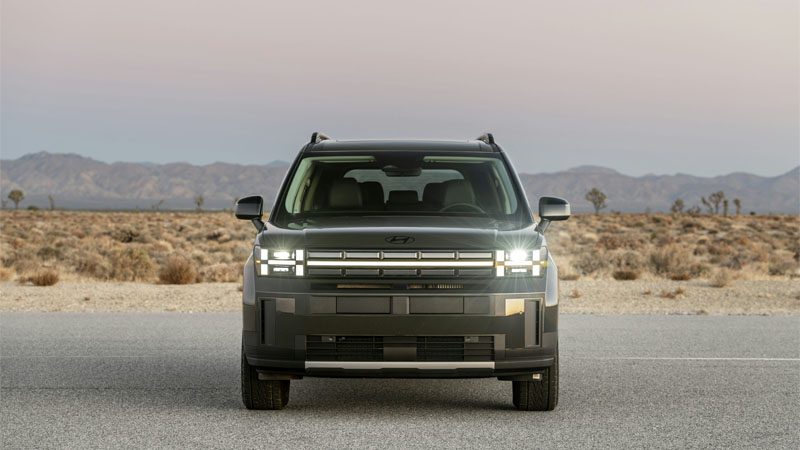
Are Hyundai Cars More Exciting Than Honda’s?
Overall, the Honda brand tends to make stiffer cars, while Hyundai positions its cars more toward comfort. Honda is known for its naturally aspirated engines; Civic and Accord offer lively performance, with standout sporty variants (Civic Si, Type R).
Hyundai’s standout performance cars are the Hyundai i30 N and the Elenatra N, both of which offer turbocharged 2.0L efficient engines. In terms of transmissions, Honda predominantly relies on CVT boxes for its “regular” cars, while performance models also come with manual transmissions.
Most Hyundai cars use traditional automatic transmissions for comfort, while performance-oriented versions tend to get dual-clutch transmissions.
Which Brand Delivers Better Fuel Efficiency for Fleet and Personal Operations?
| Category | Honda | Hyundai |
|---|---|---|
| Compact Sedan (Gas) | Civic: Up to 31 MPG city / 40 MPG highway | Elantra: Up to 32 MPG city / 41 MPG highway |
| Compact SUVs (Gas) | CR-V: Up to 28 MPG city / 34 MPG highway | Tucson: Up to 25 MPG city / 32 MPG highway |
| Hybrid Sedan | Accord Hybrid: Up to 46 MPG city / 41 MPG highway | Elantra Hybrid: Up to 53 MPG city / 56 MPG highway |
| Hybrid SUVs | CR-V Hybrid: Up to 43 MPG city / 36 MPG highway | Tucson Hybrid: Up to 38 MPG city / 38 MPG highway |
| Standout EV/Hybrid Models | Accord Hybrid (sedan efficiency leader) | Ioniq 6 (EV) — up to 361 miles range; Elantra Hybrid, very high MPG |
If you want to know what the most fuel-efficient cars of 2025 are, click here.
Which Brand Offers Better Interior Comfort, Honda or Hyundai?
Most Honda models’ interiors focus on a clean, minimalist design language with decent-quality materials, even in base models.
Seating tends to be very supportive, though rear space in compact models like the Civic is tighter than something like a Hyundai Ioniq 5.
The Hyundai brand loves bolder, more tech-friendly interiors, larger screens, ambient lighting, and softer materials, even at more approachable trims.
In terms of tech and gadgetry, Hyundai generally offers more for less, with wireless Apple CarPlay/Android Auto and advanced safety features often standard.
Honda’s tech is polished and intuitive, albeit maybe a bit dull, but Android Auto and CarPlay are also standard.
For buyers looking for the best value at the base or mid-range category, the Hyundai brand provides more features upfront, while Honda emphasizes simple refinement, strong sales, and long-term build quality.
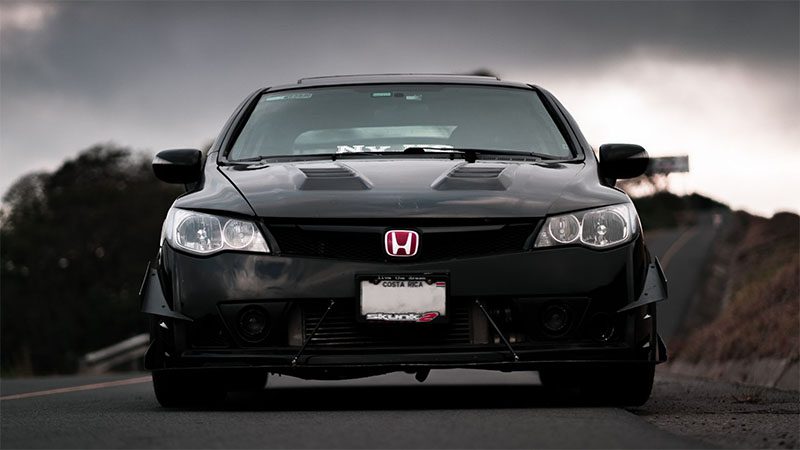
Honda vs Hyundai — Which Brand Is Better Suited for Fleet Risk Management?
Honda:
- The 2024 Honda Civic Sedan earned a 5-star overall safety rating from the NHTSA.
- It was also named a Top Safety Pick+ by the IIHS.
- Honda’s standard Honda Sensing suite includes Collision Mitigation Braking, Lane Keeping Assist, and Adaptive Cruise Control.
- Blind Spot Monitoring and Parking Sensors are available on higher trims.
Hyundai:
- The 2024 Hyundai Elantra received a 5-star overall safety rating from the NHTSA.
- It also earned a Top Safety Pick+ from the IIHS.
- Standard Hyundai SmartSense features include Forward Collision-Avoidance Assist, Lane Keeping Assist, and Driver Attention Warning.
- Blind-Spot View Monitor and Surround View Monitor are optional on select trims.
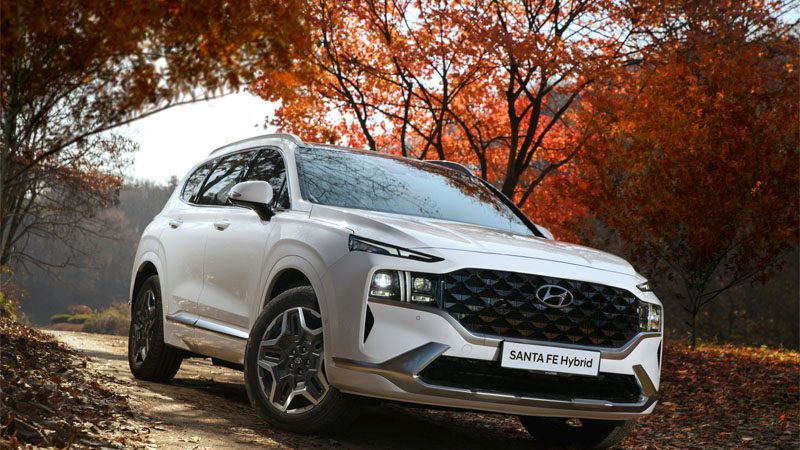
Which Brand Retains More Value for Fleet and Business Buyers — Honda or Hyundai?
Resale value and depreciation are also incredibly important when buying a reliable new car, especially if one is considering acquiring a fleet of them, and this is where Honda vehicles consistently hold an edge over Hyundai cars.
According to Kelley Blue Book’s 2025 Best Resale Value Awards, models like the Civic, Accord, and CR-V are widely recognized for retaining value over time better than most competitors on the market.
In contrast, while Hyundai’s Palisade performed quite well in the midsize SUV segment, the brand overall simply does not match Honda’s consistency in long-term value retention.
Edmunds’ data also supports this trend: the 2024 Honda CR-V is projected to depreciate about $14,354 over five years, while the 2024 Hyundai Tucson is expected to lose around $16,188.
Additionally, electric vehicles like Hyundai’s Ioniq 5 face sharper depreciation, sometimes losing up to 50% of their value within the first year, but EV depreciation is an entirely different story.
Popular Honda Models vs Hyundai Models: Head-to-Head
Honda Civic vs Hyundai Elantra
The Honda Civic has continuously impressed with sharp handling, excellent build quality, and strong resale value for decades.
It feels more premium inside, but it comes at a higher starting price. The Elantra, on the other hand, offers more standard tech at lower trims, a bold design, and outstanding hybrid fuel economy, though its interior materials feel slightly less refined in base models.
Overall, it’s the Civic that takes the win here, especially with the top-end Civic Type R with a manual transmission, a superior performance car to the Hyundai Elantra N.
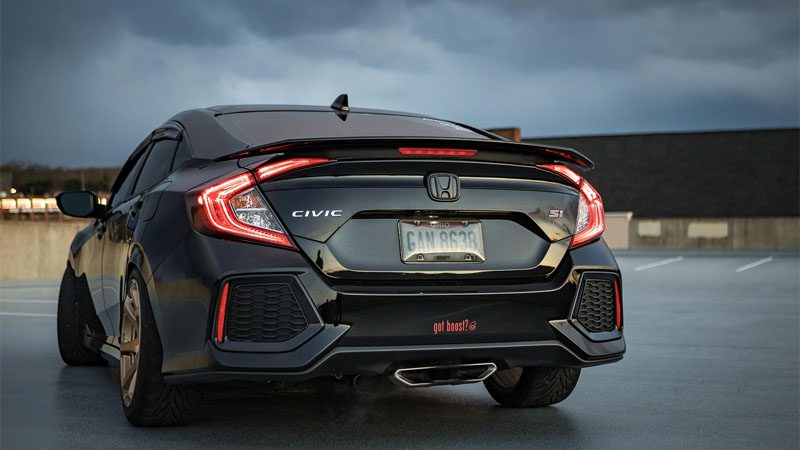
Honda CR-V vs Hyundai Tucson
The Honda CR-V vs the Hyundai Tucson is arguably the most important comparison here since these two are some of the best-selling compact SUVs on the planet.
The CR-V stands out with its smooth ride, spacious interior, and strong record for towing, making it a favorite for families. However, it’s often priced slightly higher than rivals. The Tucson delivers bold styling, a comfortable ride, and better warranty coverage, but it can’t quite match the CR-V’s resale value or cargo space.
The winner here depends on what suits you better: the CR-V’s all-around package or the Tucson’s focus on modern style and comfort.
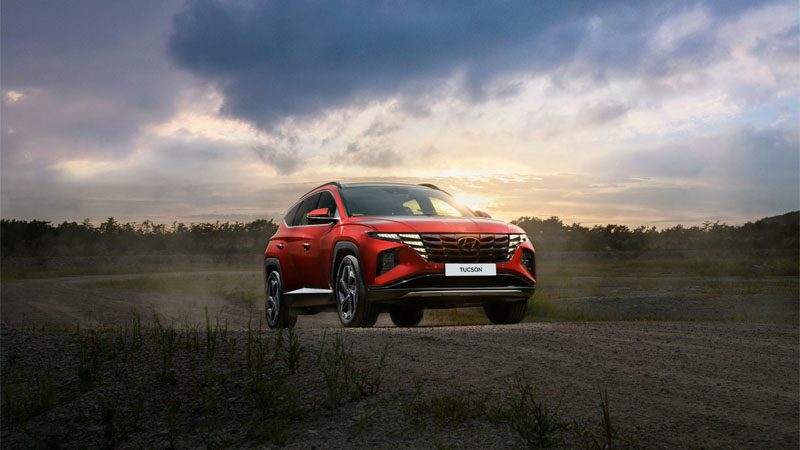
Honda Accord vs Hyundai Sonata
The Honda Accord is the true household name benchmark of the economy NA mid-size sedan market, thanks to its engaging driving dynamics, roomy cabin, and strong hybrid option. Compared to the Hyundai Sonata, the Accord carries a slightly higher price, but offers better long-term value.
The Sonata offers distinctive styling, impressive tech, and a lower starting price, although its resale value and driving feel lag slightly behind the Accord.
Overall, if you want a more tech-friendly sedan with more gadgetry, go with the Sonata, but if you want a great all-arounder, go with the Accord.

Honda CR-V vs Hyundai Santa Fe
The compact SUV battle between the Honda CRV specs and Hyundai SF is all about balancing practicality, comfort, and value, and both deliver rock-solid arguments.
The Honda CR-V shines with its class-leading cargo space, smooth ride quality, and strong fuel economy, especially in hybrid trims. It’s slightly smaller overall, but its interior feels spacious compared to the SF.
The Santa Fe is larger, has bolder styling language, and has a more upscale cabin. However, it’s a bit heavier and less fuel-efficient than the CR-V.
Ultimately, the Hyundai Santa Fe edges out the CR-V because it’s a bit larger, more premium-feeling, and offers better towing capacity.
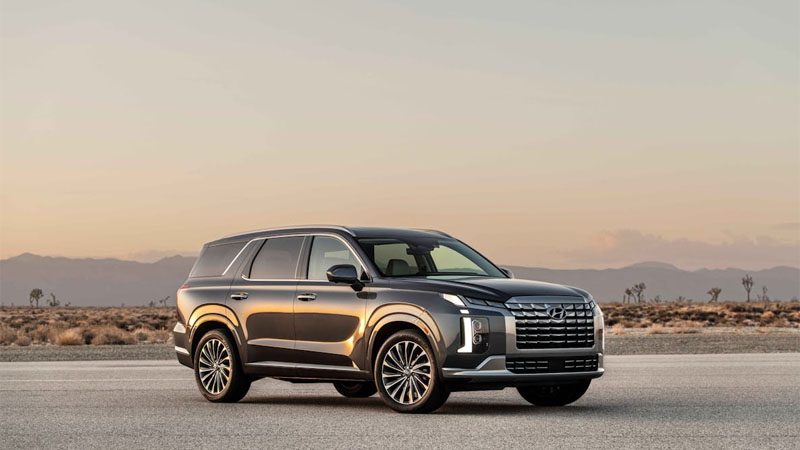
Honda Pilot vs Hyundai Palisade
The big/mid-size SUV comparison is where these two brands put everything on the table, and no matter which one of these you buy, you are likely to be very satisfied.
Either way, the Honda Pilot excels in seating flexibility, smooth V6 performance, and overall practicality, though its styling is more conservative; some might call it a bit too bland.
The Hyundai Palisade offers a more luxurious interior, high-end features even at mid-level trims, and a slightly lower price, but some buyers report a firmer ride compared to the Pilot’s smoother comfort.
All in all, the Hyundai Palisade Caligraphy trim is the clear winner here as it pushes Hyundai above what most people would expect in an affordable SUV.
Hyundai or Honda for Your Business Fleet — and Your Driveway? A Comparison for B2B and Everyday Buyers
Honda vs Hyundai – Reliability
If dependability is your top priority when buying a car, Honda remains the stronger choice as it has been consistently edging out Hyundai in this area.
On the whole, the Honda brand has a clearer market focus, and it may not innovate as much as Hyundai does, but that’s also what makes it a more reliable brand overall.

Honda vs Hyundai – Technology
As we just mentioned, technology is where Hyundai reedems itself as the brand continuously manages to offer state-of-the-art design language and luxury features within a price category where most can not.
Honda models aren’t necessarily bad at this, but it is more conservative and will not feel as cool and engaging as a top-end Hyundai model. Moreover, Hyundai also offers EVs while Honda does not.
Honda vs Hyundai – Performance
This category is tougher than most because both Honda and Hyundai offer exciting performance cars, but no Hyundai can match the Civic Type R in terms of sheer performance fun.
The Hyundai i30 N and the Ioniq 5 N are both very engaging to drive, but they don’t offer the same level of handling and excitement as the Type R does. As such, it’s Honda that wins in this regard.
Honda vs Hyundai – Comfort
If smoothness, comfort, quietness, and plush materials are what matter to you, you should go with a Hyundai.
It’s not that Honda models do not make comfortable cars; it’s just that Hyundai does it better. This is because Hyundai simply cares more about comfort, but that is also what makes it lose in the performance category.
Honda Vehicles vs Hyundai Vehicles — Who Makes the Best Cars?
The final answer to the question of Honda vs Hyundai comparison depends on what you value more, as both of these brands are impressive and have rightfully earned their positions on the market.
Resale value, performance, and reliable ownership are where Honda beats Hyundai while Hyundai wins in regards to styling, comfort, and technology.
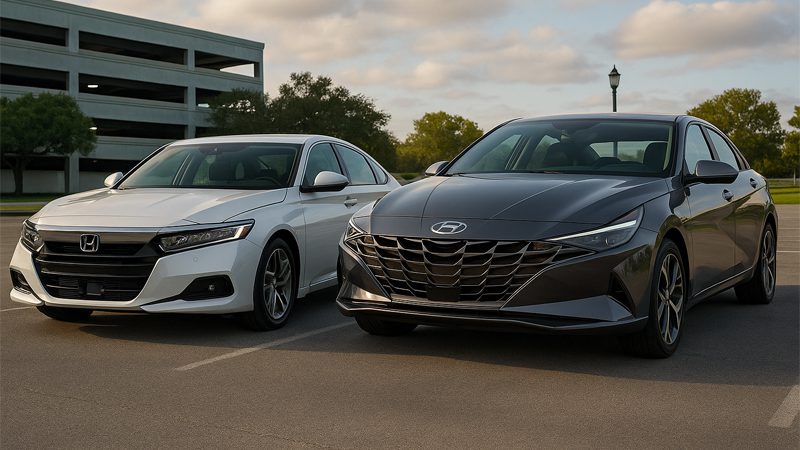
Level Up Your Business with Trusted Parts for Honda, Hyundai, and Other Vehicles!
Partner with Nanjing Woda Auto Technology Co., Ltd, a proven B2B supplier with over 25 years of global experience in the automotive parts industry!
Based in Nanjing, China, we specialize in supplying high-quality engine, ignition, electrical, exhaust, suspension, and steering system parts, targeted for businesses servicing a wide range of car brands, including Honda, Hyundai, and many others!
Our state-of-the-art engine parts are adaptable to fit various car manufacturers, helping you streamline inventory and maximize service coverage across all car brands — no matter if you’re managing a fleet or operating a local workshop!

Why Choose Nanjing Woda for Your B2B Needs?
✅ Genuine, rigorously tested quality
✅ Competitive B2B pricing tailored to your business
✅ Fast, global logistics to over 100 countries
✅ Dedicated customer service and after-sales support for B2B clients
Contact Nanjing Woda Auto Technology Co., Ltd. today and let us help power your business forward — with parts that fit better, and service that delivers more.





